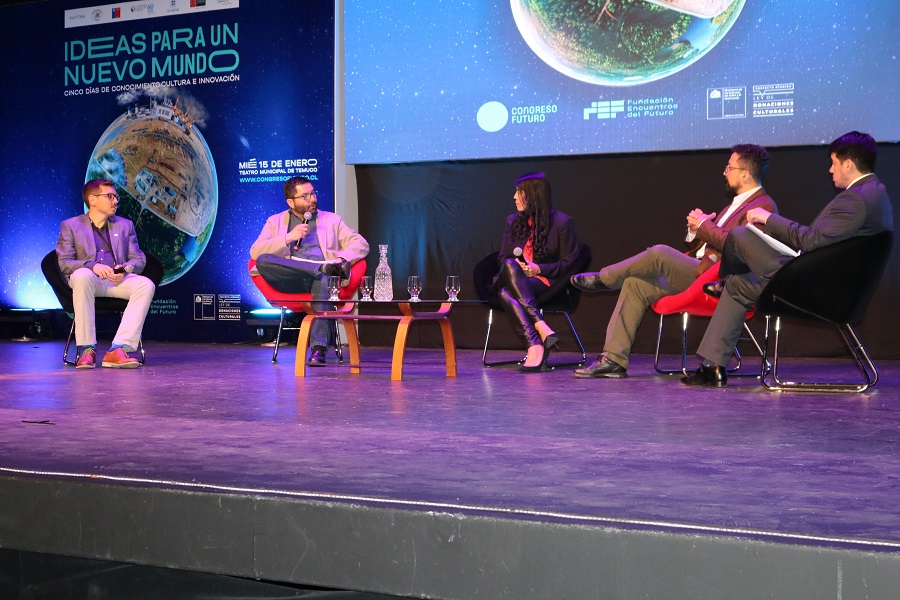|
This event for science dissemination took place in cooperation with the regional Intendancy of the Araucanía Region and the Universities Católica de Temuco, Autónoma de Chile and Universidad de La Frontera. |
Neuroscience, Bioart and public participation were the main topics of this year’s version of the Congress of the Future Araucanía 2020 (“Congreso Futuro Araucanía 2020”), which brought outstanding national and international experts together in Temuco, Chile. The congress was led by the Committee for Challenges of the Future, Science, Technology and Innovation of the Senate and the Foundation Encounters for Future and organized in our region by the regional Intendancy of the Araucanía Region and the Universities Universidad Católica de Temuco, Universidad Autónoma de Chile and Universidad de La Frontera (UFRO). The event for debate and an exchange of ideas regarding the necessity of more and improved science and technology took place at the Municipal Theatre in Temuco, allowing the civil society to think about the impact current scientific, social and cultural progress has on our daily life. “Science and Arts”, “Neurobiology and Mental Health”, and “Democracy and Participation” were the main topics addressed in three different panels, which were led by an international expert, academic staff members and researchers of the three universities that participated in the organization of the congress in the Araucanía Region. “Public participation and neuroscience are two very important topics in our region and the country. And the fact to have someone from outside sharing his opinion and knowledge on the social changes we are living, is very enriching for all of us, because it helps us to learn from and deal with the changes as a society in the future,” Dr. Renato Hunter, the Vice-rector for Research and Graduate Studies at UFRO, pointed out. “We are very happy about the partnership between these three universities and the Intendancy. The interest and number of participants was very high and we think that the addressed issues are contemporary and of high importance, contributing to the discussion and allowing to deal with interesting topics for our regional development”, said Paola Olave, the director of the UFRO Office for Outreach and Community Engagement. EXPERTS Since its first version, the Congress of the Future brought outstanding national and international thinkers, scientists and researchers together and invited the civil society to think about the future of our civilization and the impact current scientific, social and cultural progress has on our daily life. This year, three speakers participated in the congress in the Araucanía Region: John Cryan, PhD. in pharmacology, professor and chair of the Department of Anatomy and Neuroscience at University College Cork, Ireland; Joaquín Fargas, an industrial engineer, art director of the Bioart Laboratory and professor of technological art at Maimónides University in Buenos Aires, Argentina; and Ximena Hartsock, a graduate in Middle Eastern and Islamic studies, and president and co-founder of Phone2Action. The Universidad de La Frontera participated with experts in each of the three panels: Patricia Muñoz, the director of the UFRO undergraduate program in Electronic Engineering, who has a Master’s Degree in Sciences and Engineering with specialization in Electrical Engineering; Dr. Cristian Paz, a researcher of the Department of Basic Sciences and an academic staff member of the Doctoral Program in Science with specialization in Applied Cellular and Molecular Biology; and Dr. Mauricio García, an academic staff member of the Department of Social Science and of the Master’s Program in Regional, Local and Human Development of IDER-UFRO. “It is very interesting for me to address and discuss the relation between intestinal flora and neural realities, in other words: behavior, moods, etc. It would be great if this kind of events could be organized more often in order to reach the entire community, since this is not only a scientific discussion, but also a way of dissemination”, Dr. Cristian Paz pointed out.
Written by: UFRO Communications Office
|





